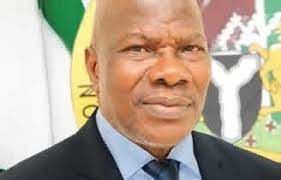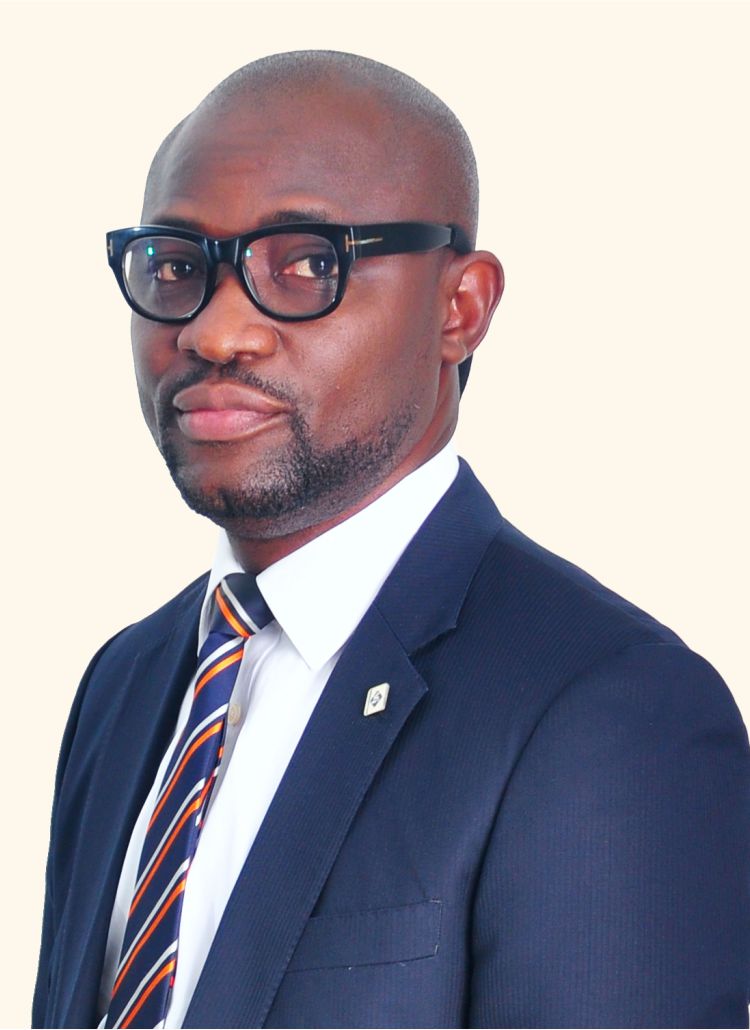Updated: Causes Of Low Price Of Insurance Stock In Nigeria And How To Curb Them

Commissioner for Insurance/CEO, NAICOM, Olorundare Sunday Thomas
In this article, EDET UDOH highlighted experts’ views on the causes of the low price of insurance stock on the Nigerian Stock Exchange (NSE) and what should be done to ameliorate the situation.
Experts in the Nigerian insurance industry have identified the causes of the low price of insurance stock on the Nigerian Stock Exchange (NSE) just as they suggested ways to curb the situation.
Some of the reasons alluded by the industry experts stem from lack of government’s interest in the industry, weak regulation, lack of adequate protection for investors’ investment, poor return on investment, unwholesome practices and unhealthy competition by insurance operators, unattractive products offering and poor services delivery, unnecessary government policies, inadequate technical and competent professionals in some areas of insurances such as Marine, Aviation, Industrial, Oil & Gas amongst others.
They believe that if all these are taken care of, the industry will be strengthened and investors will be attracted to invest in it thereby making insurance stocks more attractive to investors.
Investigation shows that with the low price of insurance stocks, investors in insurance stocks are still making returns though not so attractive as they should be.
Insurance, they believe, has huge potential, especially in Nigeria with a population of over 200 million people, of becoming the leading and most attractive business.
Industry analysts who spoke with our correspondent expressed displeasure that for over 70 years of the introduction of the insurance business in Nigeria, not much has been achieved in the industry in terms of contribution to the nation’s gross domestic product (GDP).
Speaking on this in an interview with our correspondent, the Managing Director/CEO, Allianz Nigeria, Adeolu Adewumi-Zer, called on all stakeholders to ensure a concerted effort to make the industry attractive to both foreign and local investors even as she called on the players to build their balance sheet, adding that bigger balance sheet enhances competitiveness.
According to her, there was a very interesting development in the Nigerian stock market. The insurance sector was the best performing in the country with the Nigerian Stock Exchange (NSE) Insurance Index already posting a year to date (YTD) return of 28.63% just two weeks into January 2021. It appeared that the race to recapitalization had been the driver of that unprecedented rally. Insurance regulator, the National Insurance Commission (NAICOM) had given Insurance firms until December 2020 to recapitalize or risk their licenses being revoked.
“Of course, we know that this performance surge was unsustainable. Developments since then have affected the implementation of the industry recapitalization. But the lesson is clear. There must be concerted efforts to make the industry more attractive to local and foreign investors.
“In turn, to stem the tide of premium flight due to small local capacity, insurers must build up their balance sheets. Bigger balance sheets will equally position the players to be more competitive in the areas of new product development and alternate distribution channels, which will ultimately increase market penetration.”


Casmir Azubuike, MD/CEO AfriGlobal Insurance Brokers Ltd
In his contribution to the subject matter, the Managing Director/Chief Executive Officer, AfriGlobal Insurance Brokers Limited, Mr. Casmir Azubuike, alluded the causes of low price of insurance stock to the conservative nature of insurance business, low profit margin, unhealthy competition and unethical practices, and ownership structure of some insurance companies.
’’The major cause of low price of insurance stock at the Nigerian Stock Exchange (NSE) is because of the conservative nature of insurance business. This is justifiable because whereas in other sectors, for example the banking sector and even the telecommunication sector, if they earn interest or make profit, to them it’s an income. But if an insurance company makes profit this year and in the next two to three years it keeps making profit consistently, for insurance operator it is not yet time to smile or become extravagant in spending that money because the company believes that one day there may be catastrophic loss that may lead to claims and on that day the company will be compelled to go back to that profit (reserve) to make sure that such claim is settled.
Insurance industry made provision for rainy day. They don’t easily spend what they have or declared it as profit and share out. They believe that once that profit is shared out to shareholders through dividend payout, and when claim arises, they cannot go back to them and call them to come and bail the industry out.
For instance, what happened during EndSARS protest that insurance industry has to pay so much, assuming there was no reserve in anticipation that one day such catastrophic loss will arise, what would have become of insurance industry? This is why the industry is really a very conservative industry.
’’Another reason is the low profit margin. The profit margin in insurance business is not as high as what you have in other financial sectors. Therefore, you do not expect them to pay very high dividend. It is actually out of your profit you have to make provision for your reserve – that will take care for losses when such arise. You also have to make provision for unreported claim etc before declaring whatever is left as profit.
’’Again, there is this problem of unhealthy competition in the industry. For example, if you go to the bank to ask for loan and they tell you that the rate for that particular loan is five per cent, if you go to all the banks in Nigeria, you will not get it below five per cent.
It is only in insurance industry that you find out that a company can tell you to come and do comprehensive motor insurance for five per cent, another company will ask you to come and do the same comprehensive motor insurance for the same vehicle for as low as one point five per cent. The competition is so high, very unhealthy and that is not helping the industry to make as much profit as expected that would enable them pay high dividend to attract more investors.
’’Unethical practices is another bane of low price of insurance stock. Unethical practices in the sense that you have so many people that are doing insurance business, canvassing and moving about and almost freely encroaching into the industry that are not professionals and are not duly certified. These people are now almost determining what happens in the industry and the professional practitioners are allowing such people to come into the industry and introduce all manners of unethical conduct that is undermining the growth and profitability of the industry.
’’The ownership structure of insurance companies in Nigeria is another issue. You have some companies that are still somehow owned by some group of individuals and if you look critically their capital base and their capacity to carry out risk, their capacity to generate very high premium income, and their capacity to make profit is very low. So when you have such companies that are still operating at a very minimal level, you can only expect their profitability (if any) to be minimal, same applicable to the dividend they will declare to their shareholders.
Also speaking on the issue, the Assistant General Manager, Sales and Corporate Communications, Sovereign Trust Insurance Plc, Segun Bankole, called on all the stakeholders in the Nigerian insurance value chain, to come together and work towards ensuring sustainable growth for the industry.

Rasaq Salami, Head, Corporate Communications & Market Development, NAICOM
He said it is worrisome that 70 years after the introduction of the insurance business in Nigeria, the industry has not been able to grow its premium income to one trillion naira in spite of all the initiatives put in place to actualize this.
He said until some operators play by the role, the industry might not grow beyond where it is today.
“When you have the price of insurance stock as low as 0.5 naira how can you grow this business. People still give as high as 95 per cent discounts just because they want to get the business. Do you see such a business growing over time? When you have already given out what could have come to you as revenue. How can you grow?
“What we need now is to have a business that has a dignified structure that people can actually say; I want to invest in it. When MTN came out and was selling their shares, everybody wanted to buy and become an investor in MTN because there is some level of trust and confidence or can you say the same as the insurance industry in Nigeria? I don’t think there is any insurance stock in Nigeria that is up to ten naira. You can get insurance stock with 50 kobo.
“The confidence level in the industry is low but the competition is very high that at the end of the day investors will ask you if I put my money into this business, what would be the return on my investment? How long will it take for me to begin to make a profit?
“The business is going down in terms of revenue, but expenditures are going up every day. So how are you going to break even and give money back to investors who have invested in your business and you think people will ordinarily want to patronize such business?
“With what is happening in the industry, if care is not taken, we will not have people investing in insurance anymore and perhaps, maybe, the only people that will be investing in the industry are foreign investors, because, by the time they bring Dollars and change into naira, it becomes a huge amount of money and they back it up with technology; they don’t need to spend money in marketing because they can do all these via telephone and before you know it, foreign investors will take over.
So it is high time the local practitioners come together for the betterment of the industry and the Nigerian economy generally,” Bankole said.
In his contribution, the Founder/CEO Finterate Projects Nigeria, Ekerete Ola Gam-Ikon, said though the prices of insurance stocks are low, they are people who are still trading on the stock and still getting returns.
“Comparatively, insurance stocks are poor, yet they are traded daily, so until we investigate further we may not conclude that they do not give investors return on investment. I know some people who happily trade in insurance stocks because they are cheap and they get good ROI.

Adeolu Adewumi-Zer, MD/CEO, Allianz Nigeria
“Insurance business is high on costs and returns little profit when it does, so investors are naturally more interested in what gives them relatively high and consistent returns,” Ekerete said.
He said if this narrative must change, something needs to be done about the costs of running an insurance business or getting more businesses.
Relatively low return on investment and declaration of loss position which does not allow payment of dividends, according to Ekerete, is some of the reasons insurance stocks are not attractive.
He also noted that late submission of financial reports that do not allow investment analysts reasonable time to consider and advise investors is also part of the reason.
On why some insurance companies are delisting their stocks from trading on the exchange is that they are not getting the value they expected from the market and secondly, resulting from the new acquisition, the core investors seek another strategy of growing the business.
The former President, Independent Shareholders Association of Nigeria (ISAN) Chief Sunny Nwosu, in a chat with our correspondent, blamed the problem on inconsistency in government policies.
He said the government as the largest spender in the economy has not been playing its role well especially when it comes to the issue of insurance, adding that most of the government assets are not properly insured.
Chief Nwosu said the only way the industry can be attractive to investors is when government honours its obligations by ensuring that all its assets are properly insured and adequate premium paid to the insurance industry.
Meanwhile, the industry’s primary regulator, the National Insurance Commission (NAICOM) has continued to marshal out growth-driven initiatives aimed at taking the industry to the next level of its growth.
Some of the strategic plans in place by the Commission include market conduct guideline: bancassurance guideline; Takaful Insurance guideline; Microinsurance guideline; RBS Framework/Own Risk Assessment (ORSA); Nigerian Insurance Industry ICT guideline,
Other strategies the industry can apply to achieve the growth it desired by 2030 are the issuance of Guideline on Insurance of Government Assets; Insurance Web Aggregators Operational guideline; establishment of Liaison with target state government – Lagos, Ekiti, Kano, and others; implementation machineries in place; sensitisation of NMSMEs on insurance products and benefits inherent in their consumption – Kano, Abuja, Lagos and insurance education of members of the public at the rudimental level (Sponsorship of radio and TV programmes).
The Commissioner for Insurance and Chief Executive Officer of NAICOM, Olorundare Sunday Thomas, while speaking at the just concluded retreat for financial Journalists with the theme “Improving Insurance Access through Market Development and Innovation in 2022 and beyond,” in Uyo, Akwa Ibom State capital through his representative, the Deputy Commissioner for Insurance (Technical) Sabiu Abubakar, also said that NAICOM will soon publish the ranking of insurance companies in Nigeria based on the number of claims received and paid on an annual basis to encourage claim payment.
“We had before now agreed to start ranking companies on the number of claims received and settled on an annual basis and we intend to publish such ranking for the insurance consumers. It is always an issue that put the entire industry on the edge. The Commission is doing all it can to see that the non-settlement of claims is brought to its barest minimum in the sector.”
He said the Commission is doing everything possible to encourage timely claims payment.
He noted that “claims payment has always been one aspect the industry is battling to balance. We all agree that we cannot claim ignorance of the fact that the industry is paying huge claims out there even though activities of few amongst the operators is jeopardizing the efforts of the majority”
He said the Commission has continued to intensify efforts at creating avenues and channels to deepen insurance as well as enhance access to insurance products.
“Our efforts in the development of the market are an all-inclusive one from the creation of avenues to deepen insurance penetration to increasing access to insurance products via digital platforms and increasing visibility of insurance across the nooks and crannies of the country.
“The Commission recently partnered with Financial Sector Deepening Africa, FSD Africa to launch the Bimalab Nigeria, a program to accelerate the insurtech innovation.

Mr. Segun Bankole, AGM, Sales & Corporate Communications, Sovereign Trust Insurance Plc
“Let me inform you that the Commission will soon be unveiling the Commission’s sandbox to give room for innovative expansion of insurance reach out.
“The web aggregators’ guideline is also aimed at opening access to insurance and also a means of creating a convenient market for insurance. Presentations are going to be made by subject matter experts on these issues and I believe more light will be thrown and you have the opportunity to ask questions so that you leave here more informed about the Commission’s objectives and priorities.
“As you can see so far, the Commission is focusing on using technology to boost access to insurance as that seems the way to go under the prevailing circumstance.
“We are exploring ways to take insurance to where the other financial sectors are or even surpass that mark. Financial transactions are more of a one-stop-shop for everything and are either we key in or we lose the business to more innovative outlets that will seize it from us,” NAICOM boss added.
Speaking further, he said, “As you are aware, the Commission has been implementing various market developmental initiatives to lift the insurance sector to a global standard through risk-based supervision Framework; encourage investment in digital capabilities and automation – e.g. launching of NAICOM Portal, the launch of the Bimalab Project on the 9th of February, 2021; enforcement of the compulsory insurance products in Nigeria – via a partnership with agencies and states; capacity development programmes – Actuarial, competency framework etc; sensitisation of various stakeholders – MSMEs on benefits of insurance, MDAs Insurance Desk Officers etc and introduction of regulatory reforms and policies e.g issuance of web aggregators’ guidelines.
According to him, we can gladly say that the Nigerian Insurance market has undergone substantial structural and regulatory reforms over the years following the market development initiatives being implemented and the evolution of Nigeria’s financial sector in the last decade which has been characterized by digital transformation.
He said the Commission is trying to open up the market across the geo-political zones by reaching out to the states where insurance penetration is very low.
“We expect the industry to respond to these efforts by bridging the supply gap and ensure they follow up on the Commission’s move to create awareness among high ranking policymakers in order to prove that the industry is ready for the booming opportunities awaiting them across the country. As I said earlier, the project with the Kano State Government is a litmus test for us as an industry.
Head, Corporate Communications & Market Development, AbdulRasaaq ‘Salami, speaking on a paper titled, “NAICOM’s Market Development Initiatives: The Journey so Far,” listed the efforts made by the Commission geared towards the growth of the sector.

Mr. Ekerete Ola Gam-Ikon, Founder/CEO, Finterate Projects Nigeria
Salami expressed optimism that the structures will also see to the improvement of insurance consumer trust and confidence in the sector, increase insurance contribution to Gross Domestic Product (GDP) from 0.4 per cent to over 3.0 per cent; lower insurance gap from 94 per cent to 70 per cent and increase Industry Gross Premium Income from N630 billion in 2021 to N6.0 trillion by 2030.
He said market development is a costly affair and requires huge capital to keep going thus, funding is critical, adding that however, NAICOM will continue to work with all stakeholders to develop strategic, sustainable and implementable initiatives for deepening insurance penetration to enable optimal contribution to the Nigerian economy.
Salami submitted that various actions to expand the reach or tap into a different segment/unexplored market (Retail end) and, other activities aimed at achieving insurance market development, have been put in place.
He said NAICOM will not work in isolation of all stakeholders while assuring that the commission will continue to work with all stakeholders to develop strategic, sustainable and implementable initiatives for deepening insurance penetration to enable optimal contribution to the Nigerian economy.
He noted that NAICOM has put in place structures to promote insurance as a tool for stimulating the growth of other sectors and raise funds for project development at the Federal and State levels, so as to create over 250,000 new jobs.
Continuing, he also identified, licensed four Takaful insurance companies and six Microinsurance companies to transact businesses in Nigeria; processing of other four Microinsurance and three Takaful applications at various approval stages; collaboration and written approval of the Inspector General of Police (IGP) to partner the Commission on its enforcement of compulsory insurances across the country.
He mentioned some of the achievements of the Commission to include Sensitisation of Directors and Insurance Desk Officers of MDAs; Joint committees established with MFCT on one hand and the Federal Ministry of Transport on the other; joint engagements with the Federal and State Fire Services for the commencement of enforcement of Public Building Liability Insurance and interface with the FRSC to strengthen implementation of the compulsory 3rd party motor Insurance.
On the way forward, experts explained that being quoted in the stock market is not a guarantee for high performance, so insurance companies simply need to exercise financial discipline and improve on customer service to become more attractive and pull in more business from the retail sector rather than continue on the corporate accounts.
They called on insurance operators to ensure timely submission of financial statements, improvement of income level and reduction of costs.





